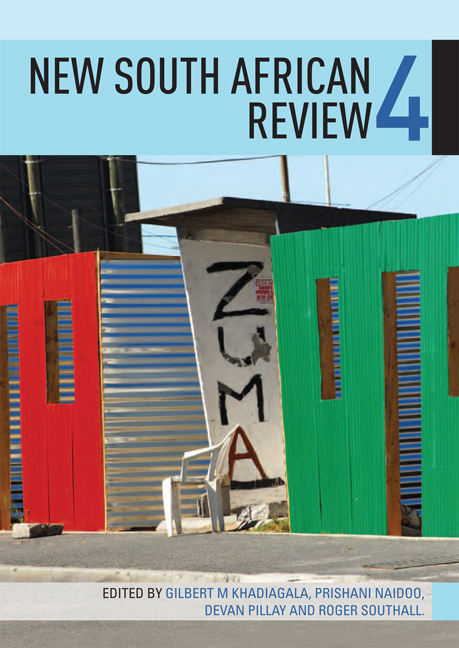Book contents
- Frontmatter
- Contents
- Preface
- Introduction: South Africa's fragile democracy: Twenty years on
- PART ONE ECOLOGY, ECONOMY AND LABOUR
- PART TWO POWER, POLITICS AND PARTICIPATION
- PART THREE PUBLIC POLICY AND SOCIAL PRACTICE
- Introduction
- Chapter 11 Why does Zimbabwe's school system out-perform South Africa's?
- Chapter 12 Higher Education in 2013: At many crossroads
- Chapter 13 Democracy without economic emancipation: Household relations and policy in South Africa
- Chapter 14 Prisons, the law and overcrowding
- PART FOUR SOUTH AFRICA AT LARGE
- Contributors
- Index
Chapter 12 - Higher Education in 2013: At many crossroads
from PART THREE - PUBLIC POLICY AND SOCIAL PRACTICE
Published online by Cambridge University Press: 21 April 2018
- Frontmatter
- Contents
- Preface
- Introduction: South Africa's fragile democracy: Twenty years on
- PART ONE ECOLOGY, ECONOMY AND LABOUR
- PART TWO POWER, POLITICS AND PARTICIPATION
- PART THREE PUBLIC POLICY AND SOCIAL PRACTICE
- Introduction
- Chapter 11 Why does Zimbabwe's school system out-perform South Africa's?
- Chapter 12 Higher Education in 2013: At many crossroads
- Chapter 13 Democracy without economic emancipation: Household relations and policy in South Africa
- Chapter 14 Prisons, the law and overcrowding
- PART FOUR SOUTH AFRICA AT LARGE
- Contributors
- Index
Summary
INTRODUCTION
In a recent survey carried out for a board meeting of Higher Education South Africa (HESA), Jeffrey Mabelebele, chief executive office (CEO) of HESA, noted that at the beginning of 2013 there existed an avalanche of more than thirty policy initiatives initiated by the Department of Higher Education and Training (DHET) and other government departments, each underway and each with important ramifications for the sector. On the one hand, these policy projects focused on broad vision-type enterprises such as the Green Paper and (soon to be released) White Paper on post-school education and training and the ministerial committee to study the possibility of ‘free’ higher education. On the other hand, there are policy projects meant to affect the sector at the more operational level: the ministerial review of the funding of universities; a review of the norms and standards for student accommodation; new reporting regulations ostensibly to bring the universities into line with the reporting requirements of government departments; the establishment of a transformation oversight committee; and the establishment of a national application and information service (NAIS). This is an ambitious policy programme by any measure. The question is: what drives it? Is it simply the passion and drive of an activist minister or are there deeper reasons and concerns that create the impetus?
In 2012-2013 the minister of higher education and training, Dr BE Nzimande, placed five universities (more than 20 per cent of the institutions in the public higher education system) under administration on the basis that they were, in some form or other, dysfunctional. This is equivalent to disbanding the councils of the institutions, in some cases suspending the vice-chancellors and appointing an administrator to act as oneperson council/executive head. It would probably be accurate to estimate that about a third of the higher education system experiences poorly functioning university councils and/or poorly functioning administrative systems. This is seriously exacerbated (or even produced) by a weak national infrastructure including the National Student Financial Aid Scheme (NSFAS) and the lack of capacity at the national Department of Higher Education – an infrastructure that has yet to fathom the complexities of the context and the serious fragility of many of the institutions.
- Type
- Chapter
- Information
- New South African Review , pp. 223 - 237Publisher: Wits University PressPrint publication year: 2014



